Have you ever found yourself without the right type of sugar while baking?
Superfine sugar is often used in cakes and other baked goods because it dissolves quickly, giving a smoother texture.
But what can you use if you don’t have any superfine sugar on hand?
What are the best substitutes for superfine sugar? The best substitutes for superfine sugar include granulated white or brown sugar, powdered or icing sugar, honey, maple syrup, agave nectar, and molasses. Depending on your recipe, some of these options might be better than others.
Don’t let missing ingredients stop you from baking!
Read on to find out which substitute will work the best for your recipe.
What Is Superfine Sugar?
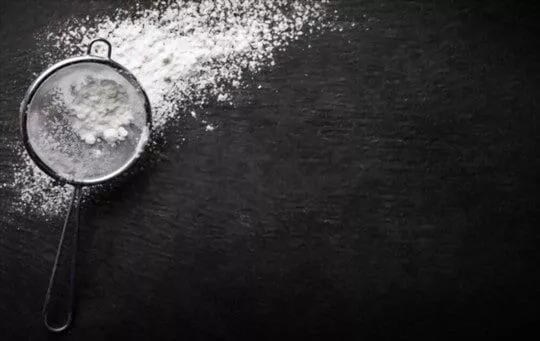
Superfine sugar, also known as caster sugar, is a type of sugar that has a finer grain size than granulated sugar.
It dissolves quickly and easily, making it ideal for use in delicate desserts and baked goods where a smooth texture is desired.
Superfine sugar is made by grinding granulated sugar more finely, which results in smaller crystals.
It is not the same as powdered sugar, which has been ground even more finely and also contains cornstarch.
Superfine sugar is often used in recipes for meringues, soufflés, and other desserts where a fine texture is important.
It can also be used in cocktails and other drinks where granulated sugar may not dissolve completely.
Here is a table comparing superfine sugar to other types of sugar:
| Type of Sugar | Grain Size | Dissolves Quickly? | Best Uses |
|---|---|---|---|
| Superfine/Caster Sugar | Fine | Yes | Delicate desserts, meringues, cocktails |
| Granulated Sugar | Coarse | Yes | General baking, sweetening drinks |
| Brown Sugar | Coarse with molasses | Yes | Baking, caramelizing, adding flavor |
| Powdered Sugar | Very fine, contains cornstarch | Yes | Frostings, icings, dusting |
| Turbinado Sugar | Coarse with molasses | No | Topping for baked goods, sweetening coffee |
| Maple Syrup | Liquid | Yes | Baking, sweetening drinks, flavoring |
| Honey | Liquid | Yes | Baking, sweetening drinks, flavoring |
The 9 Best Substitutes for Superfine Sugar
Superfine sugar is a great ingredient to have in your pantry, but it can be difficult to find in some stores.
If you’re looking for an alternative, here are nine substitutes that will still give you the same sweet results:
1 – Granulated Sugar
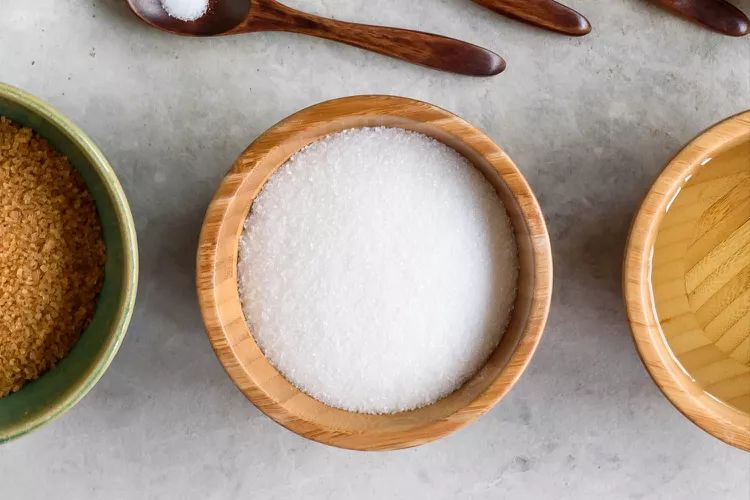
Granulated sugar is a common sweetener used in baking, drinks, and other recipes.
Derived from sugar cane or sugar beets, this crystallized form of white sugar has a fine texture and subtle flavor that makes it well-suited for various culinary applications.
As a substitute for superfine sugar, granulated sugar can be blended in a food processor until the desired texture is achieved.
This process reduces the grain size to create an even consistency, making it suitable for recipes calling for superfine sugar.
It’s important to monitor the blending process so that you don’t overprocess the sugar into a powdery consistency as this will affect your desired outcome.
2 – Turbinado Sugar
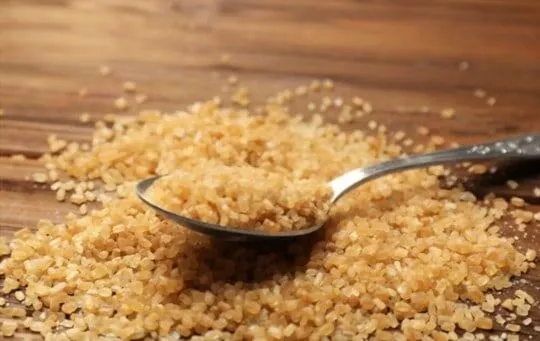
Turbinado sugar is derived from pure cane juice and has been minimally processed to retain its natural molasses content.
It features large amber crystals that offer a honeyed flavor with hints of caramel to your dishes.
When compared to granulated white sugar, turbinado boasts a more complex sweetness with delicate notes of molasses, making it ideal for baked goods such as cookies and cakes.
To substitute superfine sugar in recipes, place turbinado in a food processor along with some cornstarch or potato starch and process until the desired texture is achieved.
3 – Brown Sugar

Brown sugar is created by adding molasses to refined white granulated sugars, resulting in its characteristic moist texture and unmistakable caramel-like aroma.
Its rich flavor instantly enlivens any dish while adding depth and complexity to desserts like cakes and cookies.
Due to its moisture content, brown sugar should be processed with caution when substituting for superfine white sugars as overworking can negatively impact your end product’s structure and overall taste profile.
To avoid this issue, blend brown sugar with cornstarch or potato starch before adding it to your recipe as this will help absorb excess moisture while creating an ideal texture consistent with most baking applications calling for superfine sugars.
4 – Maple Syrup

Maple syrup, a popular sweetener made from the sap of maple trees, is an irreplaceable addition to any pantry.
Its unique flavor adds a pleasant sweetness to dishes while providing various essential nutrients and antioxidants.
The boldness of pure maple syrup pairs exceptionally well with pancakes, waffles, French toast, and other breakfast favorites.
It also serves as an ideal replacement for superfine sugar in baked goods and confectioneries due to its subtly creamy taste profile.
To ensure your recipe has a smooth consistency, use only pure maple syrup instead of flavored or imitation varieties that contain additives and preservatives.
5 – Honey

Honey has been prized throughout history for its remarkable properties and sweet taste.
This ancient nectar is rich in antioxidants and vitamins while offering a superior level of sweetness compared to table sugar.
Additionally, honey’s low glycemic index makes it suitable for those who are watching their blood sugar levels.
As an alternative to superfine sugar, honey can be used in baking recipes at equal proportions as long as you reduce the overall liquid content by 1/4 cup per cup of honey used.
This simple substitution allows you to enjoy flavorful desserts without compromising on quality or nutrition.
6 – Agave Nectar
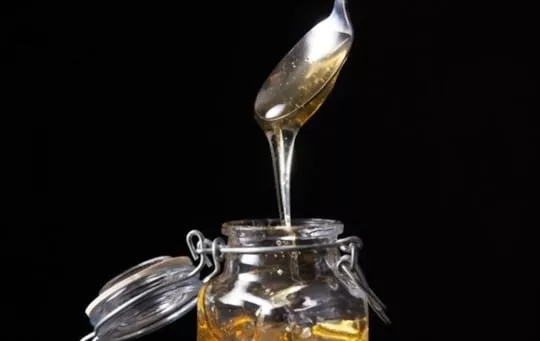
Agave nectar, derived from the agave plant, is another excellent option for replacing superfine sugar in recipes.
Not only does this sweetener offer a mild yet pleasant flavor but also provides essential nutrients like calcium and iron while boasting a low glycemic index score perfect for those with diabetes or metabolic syndrome.
When substituting agave nectar for superfine sugar, reduce the amount of liquid by 3 tablespoons per cup used in your recipe to retain optimal consistency and texture.
Additionally, consider adding a pinch of baking soda if you’re using it more than 1/2 cup per batch because agave nectar contains higher acidity than many other sweeteners naturally found in nature.
7 – Powdered Sugar (also known as confectioner’s sugar or icing sugar)

Powdered sugar, also known as confectioner’s sugar or icing sugar, is a popular sweetener renowned for its ultra-fine texture and versatility.
Unlike regular granulated sugar, powdered sugar has been ground into a fine powder, making it ideal for various applications, from baking to dusting desserts.
Its intense sweetness makes it an excellent substitute for superfine sugar in many recipes without sacrificing flavor.
To replace superfine sugar with powdered sugar in recipes, use twice the amount of powdered sugar as superfine; however, be mindful that this may make your recipe’s texture slightly different.
8 – Coconut Sugar
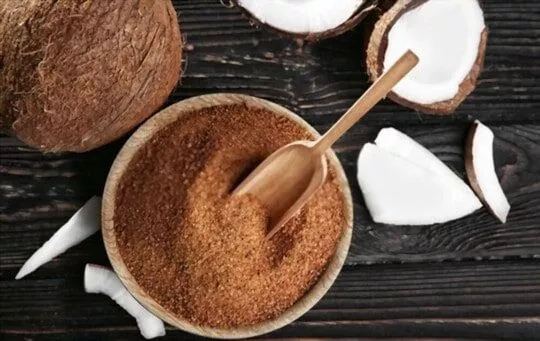
Coconut sugar is derived from the sap of mature coconut trees and offers a more healthful alternative to refined sugars.
Compared to granulated white or brown sugars, coconut sugar retains more nutritional value due to its higher mineral content.
Coconut sugar is minimally processed and boasts a subtle sweetness compared to other types of sugars.
As an excellent substitution for superfine sugars in recipes such as shortbreads and meringues, coconut sugar brings unique flavor notes while providing a rich caramel hue to your creations.
9 – Stevia

Stevia is an all-natural sweetener extracted from the leaves of the stevia plant native to South America.
It offers a host of benefits compared to other artificial sweeteners due to its low glycemic index and calorie content.
Although it has no impact on blood glucose levels, stevia can provide up to 200 times more sweetness than traditional table sugars making it suitable for people with diabetes or those trying to reduce their refined-sugar intake.
In terms of taste, stevia contains an intensely sweet note without leaving any aftertaste; however, care must be taken when using this natural sweetener due to its potency —a small pinch goes a long way!
When replacing superfine sugars with stevia in recipes such as puddings or cakes be sure you use only half the quantity suggested in the recipe for optimal results.
Frequently Asked Questions (FAQs)
- Can you make your own superfine sugar? Yes, you can make your own superfine sugar by processing granulated sugar in a food processor or blender until it becomes a fine powder. This can be a good option if you don’t have superfine sugar on hand and need it for a recipe.
- Can you replace superfine sugar with powdered sugar? While powdered sugar can be used as a substitute for superfine sugar in some recipes, it is not always a 1:1 substitution. Powdered sugar contains cornstarch, which can affect the texture of the final product. Additionally, powdered sugar is much sweeter than superfine sugar, so you may need to adjust the amount used in the recipe.
- What is the same as superfine sugar? Granulated sugar can be used as a substitute for superfine sugar in many recipes. However, it may not dissolve as easily as superfine sugar, which can affect the texture of the final product.
- Is superfine sugar just powdered sugar? No, superfine sugar is not the same as powdered sugar. While both have a fine texture, powdered sugar is even finer and contains cornstarch, which can affect the texture of the final product. Superfine sugar is often used in recipes where a smooth texture is desired, while powdered sugar is typically used for frosting, icing, and dusting.
Conclusion
In conclusion, superfine sugar, also known as caster sugar, is a type of sugar that has a finer grain size than granulated sugar.
It is often used in delicate desserts and baked goods where a smooth texture is desired.
However, if you don’t have superfine sugar on hand, there are several substitutes you can use.
Here is a table summarizing the substitutes for superfine sugar:
| Type of Sugar | Grain Size | Dissolves Quickly? | Best Uses |
|---|---|---|---|
| Superfine/Caster Sugar | Fine | Yes | Delicate desserts, meringues, cocktails |
| Granulated Sugar | Coarse | Yes | General baking, sweetening drinks |
| Brown Sugar | Coarse with molasses | Yes | Baking, caramelizing, adding flavor |
| Powdered Sugar | Very fine, contains cornstarch | Yes | Frostings, icings, dusting |
| Turbinado Sugar | Coarse with molasses | No | Topping for baked goods, sweetening coffee |
| Maple Syrup | Liquid | Yes | Baking, sweetening drinks, flavoring |
| Honey | Liquid | Yes | Baking, sweetening drinks, flavoring |
| Coconut Sugar | Coarse | Yes | Baking, sweetening drinks, flavoring |
| Stevia | Very fine | Yes | Baking, sweetening drinks, low-calorie option |
Each of these substitutes has its own unique flavor and texture, so it’s important to choose the one that best fits your recipe. With these options, you can easily replace superfine sugar in your favorite recipes and still achieve the desired result.

The 9 Best Substitutes for Superfine Sugar
Ingredients
- Granulated Sugar
- Turbinado Sugar
- Brown Sugar
- Maple Syrup
- Honey
- Agave Nectar
- Powdered Sugar (also known as confectioner's sugar or icing sugar)
- Coconut Sugar
- Stevia
Instructions
- Pick your favorite substitute from the list above.
- Follow cooking directions for your selected substitute with the proper ratio of ingredients.
Jenny has always been passionate about cooking, and she uses her platform to share her joy of food with others. Her recipes are easy to follow, and she loves giving tips and tricks to help others create their own unique culinary creations.

